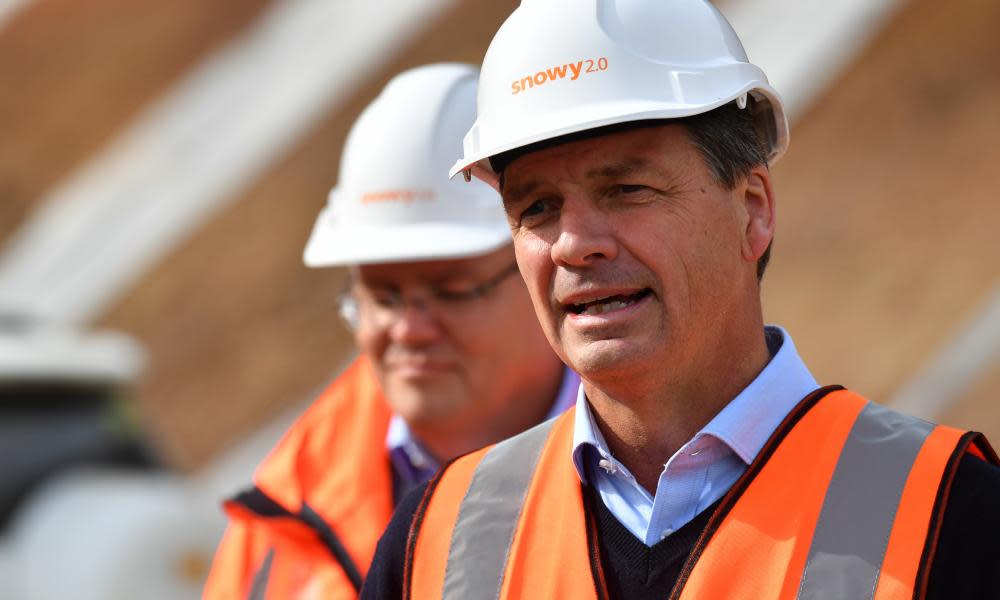Morrison government 'ignored' Climate Change Authority's advice on Covid recovery

The Morrison government has been accused of ignoring advice from one of its agencies that it should use the economic response to Covid-19 to “set up Australia for generations to come” by directing stimulus spending to measures that also addressed the climate crisis.
A Climate Change Authority report submitted to the government in July says the stimulus package offered a “once-in-a-lifetime” chance to jump-start a recovery and deal with climate change by preparing for inevitable impacts and positioning Australia to take advantage of its abundant clean energy resources.
“It’s a win-win-win opportunity for economic recovery, resilience and prosperity in a low-emissions world,” the report says.
A Senate estimates hearing on Tuesday night was told the report was discussed with the office of the emissions reduction minister, Angus Taylor, and officials from Treasury and the industry department, which has responsibility for climate change policy.
In response to questions from Labor, the authority’s chair, Wendy Craik, said she did not know if Taylor had read it and he had not officially responded to it.
The authority posted the report on its website without fanfare and it received little to no media coverage. It was submitted as governments across the globe were being urged to tackle the climate crisis alongside the pandemic.
The Morrison government has emphasised the need for a gas-led recovery from recession, and announced $52.9m to develop plans to increase gas supply and transportation infrastructure. It re-funded the Australian Renewable Energy Agency (Arena), allocating it $223.9m over the next four years in the budget and promising $1.4bn over a decade while planning to change its mandate, but has been criticised for not doing more to back renewable energy.
Labor’s climate spokesman, Mark Butler, accused the government of refusing to engage with the authority’s report, saying it was not surprising as it had “completely gutted” the agency after trying and failing to abolish it.
He said backing renewable energy projects and developing clean energy manufacturing would create tens of thousands of jobs, stimulate regional economies and lead to cheaper power prices while tackling climate change.
“To ignore a Covid-19 recovery plan which highlights the massive potential of renewable energy and renewables-related industry is exactly the type of ideological bias that has undermined progress under the Liberals,” Butler said.
A spokesperson for Taylor responded that the government was taking action consistent with recent reports by the authority, pointing to a proposed $1bn “grid reliability fund” to expand the remit of the Clean Energy Finance Corporation.
While the authority said the corporation should be allowed to “invest in emissions reduction technologies in all sectors”, Labor has said it would oppose the change as it would open up the corporation, which operates as a green bank, to fossil fuel investments.
Craik told Senate estimates some issues raised in the report had been picked up by the government “in one way or another”, including in a low emissions technology statement that was in the works before the pandemic, support for clean hydrogen and soil carbon, and proposed changes to Arena and the CEFC.
But the report suggests a more holistic climate focus in the pandemic recovery. It calls for a stimulus package that takes account of climate risks and opportunities to create a “virtuous cycle” in which a more prosperous economy led to better preparation for the impacts of climate change, and vice versa.
It cites evidence from the Nobel prize winner Joseph Stiglitz and economist Nicholas Stern suggesting sustainable stimulus measures could offer the best economic returns and says governments in Europe, New Zealand and South Korea had made efforts to head down this path.
The authority defines recovery as being about “getting people back to work and businesses back to business”, and says there were many renewable energy projects that could make a strong contribution to that.
“According to the Clean Energy Council, bringing forward the pipeline of renewable energy projects could create over 50,000 new direct jobs, help drive down power prices, triple the amount of large-scale renewable energy capacity in the country and stimulate private investment into rural and regional areas,” it says.
It repeats recommendations the authority made in a “climate policy toolkit” report in March, including government support for:
Energy efficiency programs targeting low-income households and small businesses including tax incentives and grants.
Greater investment in electricity networks and technologies such as batteries and pumped hydro to support variable solar and wind energy.
Electrification and industrial energy efficiency projects in regional areas.
Electric vehicle charging infrastructure on highways and regional routes, and targets for government fleets to take up the technology.
An agency equivalent to the Clean Energy Finance Corporation (CEFC) dedicated to reducing greenhouse gas emissions from “the land sector”.
Related: ‘New jobs, new industries, new wealth’: Kevin Rudd’s vision for a green recovery out of the pandemic
Craik told Senate estimates that Taylor had been briefed on the March report, but there had not been further discussion with him about its recommendations.
She said the authority was not consulted about the government’s plans for a significant gas industry expansion. Its July report says gas can play a role “in the mix” of large-scale sources of electricity generation, and suggests energy deals with states include programs that reduce emissions by improving efficiency in gas production, but it does not call for a government-backed gas-led recovery.
Several non-government reports have made suggestions for a green recovery from Covid-19 to set up the economy for the decades ahead. Beyond Zero Emissions, a climate change thinktank, won support from former prime ministers Malcolm Turnbull and Kevin Rudd for an analysis that concluded projects to rapidly cut emissions could modernise industry and create work for an average of 355,000 people a year over five years.


